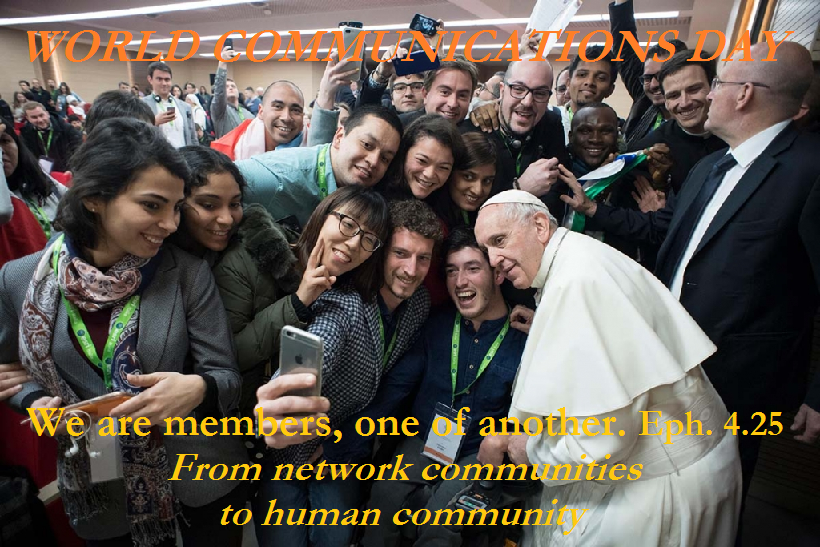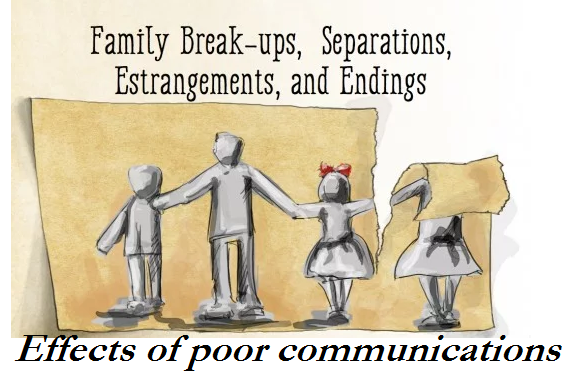World Communications and 7th Sunday of Easter
Acts 7:55-60; Apocalypse 22:12-14,16-17, 20; Gospel of John 17: 20-26

Preached by Msgr Philip Heng, SJ at Cathedral of Good Shepherd, Singapore on 2 June 2019
Today, we celebrate the 7th Sunday of Easter and also the “World Communications Sunday.” In today’s Gospel, Jesus prays to His Father for His disciples and /for us, who are believes in His Word some 2,000 years after He has proclaimed them.
 Jesus prays, “Father, may they be one in us; . . . with Me in them and You in Me, may they be so completely one, that the world may realise that it was You who sent me, and that I have loved them as much as You have loved Me.”
Jesus prays, “Father, may they be one in us; . . . with Me in them and You in Me, may they be so completely one, that the world may realise that it was You who sent me, and that I have loved them as much as You have loved Me.”
My brothers and sisters in Christ, when Jesus prayed that all Christian believers are “united” in a “oneness of our love for Him and His Father,” He is praying that we as believers, will continue to persevere, flourish as His effective witnesses to all peoples, especially for those who do not yet know Him and the Gospel. In other words, Jesus is commissioning you and I to draw more people closer to Him and the Gospel. How is this to take place? Jesus in today’s Gospel prays that we witness to the “unity and oneness of our love for Him” in the daily living of our lives in our homes, churches, workplaces and where ever we are.
There is a story of a David, a frail old man, who lived with his son, daughter-in-law, and a four-year old grandson. David’s hands were trembling as he was suffering from Parkinson’s illness. His eyesight too was bad and he could hardly walk as his knees were very weak.
The family ate together nightly at the dinner table. But David’s shaky hands and failing sight made eating rather difficult. Peas rolled off his spoon onto the floor. When he grasped the glass often milk spilled on the tablecloth. David’s son and daughter-in-law became irritated with the mess. “We must do something about grandfather,” said the son. I’ve had enough of his spilled milk, noisy eating, and food on the floor. So the husband and wife set a small table in the corner.
There, grandpa David ate alone while the rest of the family enjoyed dinner separately. Since grandpa had broken a dish or two, his food was served in a plastic bowl. Sometimes when the family glanced in grandpa’s direction, they could see that he had tears in his eyes as he was eating alone. However, this did not affect the family. In fact, whenever David would drop and spill something, his son and daughter-in-law would make very hurting remarks on grandpa.
One day, the family went out for shopping in the supermarket. The young son, brought to the counter, a set of plastic plates and asked, “Mommy, daddy, can use my savings to buy these plates please?” Why do you need them? “Mommy, daddy, they are not for me. I want to keep them for you and mamma to use when you get old.”
Then tears started to stream down their cheeks. Though no word was spoken, both knew what must be done. That evening the both of them took grandpa’s hand and gently led him back to the family table. For the remainder of his days he ate every meal with the family. Grandpa started smiling again; and more importantly, somehow, neither husband nor wife seemed to care any longer when a fork was dropped, milk spilled, or the tablecloth soiled.
In this story, let us note that it took a four year’s old boy to awaken his parents on how they were treating grandpa, were actually sowing the seeds of selfishness and self-centredness, that they would inherit from their own son, when they get old.
 My brothers and sisters in Christ, as Jesus prays to His Father that there be unity and peace in the way we live and relate with one another. Fr Joseph Galdon, a Jesuit priest once took a survey among married couples. In the survey he asked them to list the qualities which they felt were most important in marriage. 85% of the respondents listed good communication as one of the most important of all qualities in making a marriage work.
My brothers and sisters in Christ, as Jesus prays to His Father that there be unity and peace in the way we live and relate with one another. Fr Joseph Galdon, a Jesuit priest once took a survey among married couples. In the survey he asked them to list the qualities which they felt were most important in marriage. 85% of the respondents listed good communication as one of the most important of all qualities in making a marriage work.
In other words, if we wish to develop good and healthy relationships, then good communications are essential. We know from our experiences that many heartaches, many anxieties and divisions, and quarrels have resulted from poor communication.
In Fr Galdon’s reflection on effective and good communication, he points out that most people are not truly open when communicating their true and deepest intentions; most people hide a lot, especially from the people we love. Perhaps, we are afraid that if they know everything about us, they may love us less or may not even love us. As such, sharing our true self and relating to people on a deep and authentic manner is never easy and common. As such, very often it seems, that to communicate at a superficial level is safer.
 True communication is genuine and deep listening, and dialogue with one another. Ponder for a moment on the way you communicate with your spouses and family, and even the people who mean much to you. We listen, but do we really hear what they are saying and going through. Do we really sense the non-verbal communication that they are lonely and are in pain?
True communication is genuine and deep listening, and dialogue with one another. Ponder for a moment on the way you communicate with your spouses and family, and even the people who mean much to you. We listen, but do we really hear what they are saying and going through. Do we really sense the non-verbal communication that they are lonely and are in pain?
Do we really speak to one another, and listen with genuine interests what the other person has to say to us? Or when we talk are we only interested in what we have to say, but are not really interested in what others have to say to us? An anonymous writer once wrote, “When I ask you to listen to me, you start giving me advice; in doing so, you are not listening to me. When I ask you to listen to me, you begin telling me why I shouldn’t feel that way; in doing so, you are trampling on my feelings. When I ask you to listen to me; you feel you have to do something to solve my problems. In doing so, even as it seems strange, you have failed me. So, please, please listen to me for a while. And if you want to talk, wait a few minutes; listen to what I have to say first; let me finish, and then I promise you, I will listen to you.”
I am sure we have all seen the little statuettes of the “three monkeys” where the first monkey sees no evil; the second monkey hears no evil, and the third monkey speaks no evil?” Well, do you know that the social media has found the “fourth monkey”? You find him this monkey not in whatsapp, but in “whatsape”. This “fourth monkey has the characteristics of all the three monkeys: “he does not see, he does not hear and he does not speak to anybody”. This is because he has no time for anybody! He spends his day staring and using his “smartphone” and he is called “smartphone monkey.”
 In other words, it is highly probable that many of us have sub-consciously fallen in love with our own ideas and are self-absorbed by what interests us. An indication of such “self-centred” attitude is that we find it difficult to spend time to serve the needs and interests of others. For example, when as a family, you go for shopping or have dinner or a vacation together, “Do we lose interests and get impatient in what the family is doing when what the family chooses is not of our interests? Do we find it very painful to spend time to care for our aged and sick parents and family member when such care demands much sacrifice and time?” Or, are we too self-absorbed in our own interests in our life?
In other words, it is highly probable that many of us have sub-consciously fallen in love with our own ideas and are self-absorbed by what interests us. An indication of such “self-centred” attitude is that we find it difficult to spend time to serve the needs and interests of others. For example, when as a family, you go for shopping or have dinner or a vacation together, “Do we lose interests and get impatient in what the family is doing when what the family chooses is not of our interests? Do we find it very painful to spend time to care for our aged and sick parents and family member when such care demands much sacrifice and time?” Or, are we too self-absorbed in our own interests in our life?
And so, my brothers and sisters in Christ, one of our biggest problem we face today is that the mass media, the technological world and our social media of our secular society have influences us into becoming people who are very impersonal and impatient. This is represented very well by the “fourth smartphone monkey”; today we “hardly talk and communicate with one another meaningfully anymore; time is precious and we all live a very hectic life. And so we have the tendency to become too self-absorbed with our own needs.
There is an Aesop story of a man Tom who was crossing a desert and came across another man, Harry who was hiring his donkey for those who need its service. Tom accepted the offer, even though it was a high price, as he was too tired to walk. After a few hours in the hot sun, Tom decided to take a break. As Tom got off the donkey, realised that the donkey casts a nice shadow on the ground. So he lied down on the ground under the cool of the shadow and soon feel asleep.
After some time, Harry, the owner of the donkey, who was standing in the sun, and seeing Tom resting in the shade of the donkey, realised what was happening. So, he quietly moved the donkey a few feet away from Tom, and he in turn sat and rested under the shade. Soon after this, Tom woke up, in the heat, and saw what was happening. He shouted at Harry and demanded the shade, as he had paid for the services of the donkey. Harry replied, that Tom had only paid to ride the donkey, but not the shadow. And that if he wanted the shade of the donkey, he has to pay for the additional services.
As Tom and Harry argument got heated, Harry could not take it anymore and slapped Tom. As they began to fight, the donkey got frightened, and ran away. Tom and Harry then realised that both of them are stranded in the desert, not only without the shade, but also without any donkey.
My brothers and sisters, as I conclude, let us remind ourselves that Jesus in today’s Gospel prays, “Father, may they be one in us; . . . with Me in them and You in Me, may they be so completely one, that the world may realise that it was You who sent me, and that I have loved them as much as You have loved Me.”
 This oneness, unity and love that Jesus prays to His Father that we all have can only be preserved and nurtured only if we have the wisdom to value each other at a deeper and more authentic level. And for this, one of the most important need we have to address is setting aside precious time during the day when we do NOT allow our phones, ipads, and computers to become hindrances toward spending quality time building deeper relationships and communicating at a deeper level, as family, as true friends in the Lord. Have you come across tables in restaurants where the food ordered is getting cold, because hardly anyone is eating, but each person is staring at the smartphone? Is this happening to us too?
This oneness, unity and love that Jesus prays to His Father that we all have can only be preserved and nurtured only if we have the wisdom to value each other at a deeper and more authentic level. And for this, one of the most important need we have to address is setting aside precious time during the day when we do NOT allow our phones, ipads, and computers to become hindrances toward spending quality time building deeper relationships and communicating at a deeper level, as family, as true friends in the Lord. Have you come across tables in restaurants where the food ordered is getting cold, because hardly anyone is eating, but each person is staring at the smartphone? Is this happening to us too?
In other words, the “smartphone monkey” is not that smart after all because he can prevent relationships from deepening. And if we are addicted to what he is offering, he may even destroy our family and our faith.
David’s grandson in our story awakened his parents to the truth that if we are not wholesome in the way we live our family life, our children will learn our bad attitudes will treat us the same way as we treat others. And as for the self-absorbed Tom and Harry who quarrelled and lost everything when the donkey ran away, we too can lose our family and faith if we become self-centered in our needs.
Indeed, all that are precious in our lives, given by God, can be lost if we are not fully conscious of Jesus’ call that we continue to build our relationships on good communication, habits and attitudes, with others and with God Himself. As Jesus prays that we are “one” and become “one” let us not take any person and God for granted.
Adapted from: http://rishikajain.com/2013/05/27/the-wooden-bowl-a-touching-story-on-family-love-parents-relationships/
Adapted from: https://shareitsfunny.com/the-fourth-monkey/
Adapted from: The Chain of Love – Essays for Daily Living: Joseph A. Galdon,S.J.; Cacho Hermanos,Inc.; 1993; pp.3-7.
Adapted from: Story of Bob Garner; bobgarneronline.com
Msgr Philip Heng, S.J.

